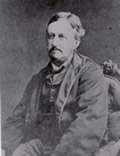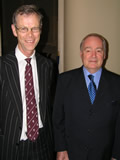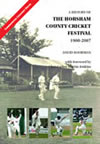About Arthur Haygarth

Arthur Haygarth, besides being a fine cricketer, is arguably the greatest cricket historian to date. He devoted his entire life to the sport. He was born in Hastings, Sussex, on 4th August 1825 and educated at Temple Grove School in East Sheen, before moving to Harrow between 1840 and 1843 – playing cricket most of the time, it seems, as he was not a very good student. He was the lynchpin in the victorious teams over Eton and Winchester at Lord’s in both 1842 and 1843. The great Alfred Mynn once said that he would rather bowl to Fuller Pilch, the greatest batsman of his day, than Haygarth and W A Bettesworth commented when writing his biography in Cricket: A Weekly Record of the Game in 1902: “So strong was his defence and so unwearied his patience, that if today had been the present, matches against English teams in Australia would drive critics to despair, for Mr Haygarth would doubtless be chosen as one of the representatives of England – unless, indeed, Australia rose to a man to bar him.”

Christopher Martin-Jenkins (left) with David Frith. Photo by Ian Jackson
Haygarth devoted this same relentlessness to researching the history of cricket and meticulously set about recording every cricket match of importance, linked to significant historical facts, from the very beginning of the history of the game to what turned out to be his last year in 1903. He contributed articles to Bell’s Life and Cricket, made major contributions to Frederick Lillywhite’s Cricketers’ Guide, edited for a time John Lillywhite’s Cricketers’ Companion but, besides being responsible for a number of other booklets, his lasting contribution was the mammoth Cricket Scores and Biographies which stretched to 14 volumes in his lifetime. Published between 1862 and 1895, they covered the game in unbelievable detail from its beginnings until 1878. There are more than 10,000 pages in these books and they record more than 10,000 scores with nearly 1000 biographies. Since Haygarth’s death on 1st May 1903 in Pimlico, London, two further volumes have been published. F S Ashley Cooper edited the 15th volume, which only contained biographies in 1925 – one hundred years after his birth – and Roger Heavens produced Volume 16 in 2003 – one hundred years after his death – which covered 1879. Haygarth wrote a further 19 volumes covering the game to 1898 and these manuscripts are lodged at Lord’s in the MCC archive. The famous club has generously made these documents available to Roger Heavens with a view to publishing the remaining books, of which Volume 16 was the first. Testament to Haygarth’s stature lies in the fact that David Frith and Christopher Martin-Jenkins gave their time to unveiling commemorative plaques on the houses where Arthur was born and died.


